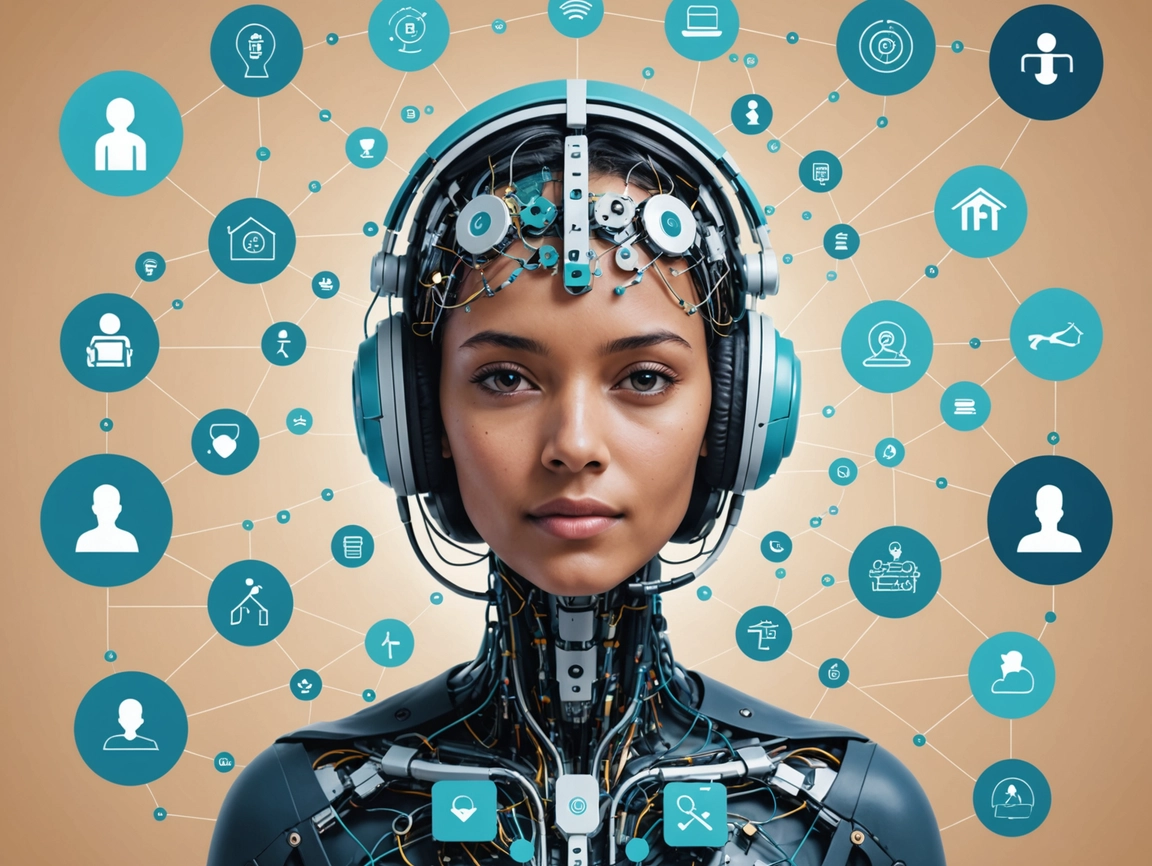Mental well-being is a really hot topic today. People face increasing levels of anxiety, depression, and stress, which fuels a constant search for tools aimed at prevention, diagnosis, and proper care. This search seems never-ending. Artificial intelligence (AI) is emerging as a potential game changer, capable of revolutionizing how we approach mental health both in clinical settings and in the real world, helping to prevent recurring issues. AI offers opportunities for patients to receive specialized care, detect problems early, and maintain ongoing support, benefiting not only patients but also mental health professionals.
What Does AI Have to Do with Mental Health?
Artificial intelligence involves computer systems that can mimic human brain functions. These systems have the ability to learn, make decisions, and recognize patterns that are typically detectable only by humans. In the mental health field, AI is being used to analyze vast amounts of data, identify early warning signs of conditions like anxiety, and create tailored solutions. This technology allows mental health professionals to access more precise data, enabling treatments that are better targeted to individual needs.
AI in Diagnosis and Early Detection
AI can analyze how people communicate, what they write, and even their online behaviors to detect red flags for depression, anxiety, or other unnoticed mental health problems. This enables early intervention and may prevent more severe conditions from developing.
Virtual Therapy and Chatbots: AI-assisted therapy platforms, including chatbots, provide emotional support, track moods, and suggest coping strategies. While they are not substitutes for human therapists, they improve access to care immediately and continuously.
Patient Monitoring: Wearable devices and smart apps collect data on sleep patterns, physical activity, and emotional states. AI processes this information to alert professionals when risks of crises or relapses arise, allowing for timely intervention.
Personalized Interventions: AI can propose treatment plans customized for each patient, based on their behaviors, history, and preferences.
Support for Scientific Research: Researchers use AI to analyze massive health datasets, identifying trends and risk factors. This accelerates the development of new therapies and improves care based on empirical evidence.
Benefits of AI in Mental Health
The advantages of AI in mental health are significant:
Expanded Access to Services: Individuals in rural or underserved areas can access care through digital platforms and chatbots, reducing barriers.
Early Problem Detection: AI can identify symptoms before they worsen, easing the burden on traditional healthcare systems.
Improved Efficiency and Lower Costs: Automated monitoring and data analysis free professionals to focus on critical treatment.
Personalized Therapeutic Approaches: AI enables customized strategies for each patient, increasing the likelihood of treatment adherence and success.
Enhanced Clinical Judgment: AI provides data-driven insights that help professionals choose the best treatments, reducing errors and improving outcomes.
Insightful Data Discovery: AI uncovers patterns in patient behaviors and responses to therapy that may not be visible to human clinicians, enhancing treatment planning.
Risks and Ethical Considerations
Despite its benefits, AI in mental health also poses challenges:
Data Privacy Issues: Handling sensitive patient information carelessly could lead to breaches of confidentiality and misuse of private data.
Overreliance on Technology: Dependence on AI may reduce human interaction in therapy, potentially weakening therapeutic relationships.
Lack of Empathy: Chatbots and intelligent systems can simulate understanding, but they cannot fully replicate a human professional’s empathy and judgment.
Algorithmic Bias: If training data is biased, AI may provide incorrect diagnoses or guidance, affecting treatment quality.
Societal Impact: Widespread AI adoption could change patient-therapist interactions, requiring policies for ethical implementation.
Examples of AI Innovation in Mental Health
Woebot: An AI chatbot using cognitive-behavioral therapy principles, providing emotional support and regular mood tracking.
Mindstrong Health: A platform monitoring smartphone use to detect changes in mental health, alerting professionals to potential depressive or anxious episodes.
AI in Telepsychology: Systems that analyze video interactions to detect microexpressions and emotions, giving therapists deeper insight into patients’ feelings.
Digital Wellness Apps: Apps combining AI, mindfulness, meditation exercises, and habit tracking to encourage preventative mental health practices.
Social and Global Impacts
AI in mental health extends beyond clinical treatment, reshaping social attitudes and accessibility. By making mental health resources more reachable, AI may reduce the stigma of seeking therapy, especially in regions with limited support. AI-powered platforms also promote awareness about common disorders and provide tools to manage stress, anxiety, or depression. These innovations have the potential to foster healthier communities, reduce work absences, and enhance productivity.
The Future of AI in Mental Health
AI is poised to transform psychological care by:
- Predicting emotional issues before they arise.
- Tailoring therapies and preventative programs to individual needs.
- Assisting scientific research by analyzing extensive patient data.
- Collaborating with experts to refine diagnoses and treatment plans, combining human insight with computational precision.
A careful, ethical approach is essential, prioritizing privacy, fairness, and responsible implementation. AI should complement, not replace, human connection in therapy. Regulations are necessary to ensure safe use, including data protection, informed consent, and unbiased algorithms.
Conclusion
Artificial intelligence is a game changer in mental health, opening doors to faster detection, continuous monitoring, and personalized treatment. While challenges exist, careful use of AI can improve patient outcomes and expand access to care. Integrating AI with mental health professionals promises a future where prevention, treatment, and emotional well-being are more accessible to all. Ethical and responsible application is key to maximizing AI’s positive impact on global mental health.
latest posts published

Are you starting to run? This is how we persevere!

Your time invested profitably every day: What are your EPAs?

Energy flat rate: who is entitled to the 300 euro bonus?

Here’s how companies choose the right solution

Set and achieve goals with SMART

Different working models and employee retention: a connection?

Flexible working hours

Personal Kanban in the notebook: be productive

Reporting for effective workforce management


